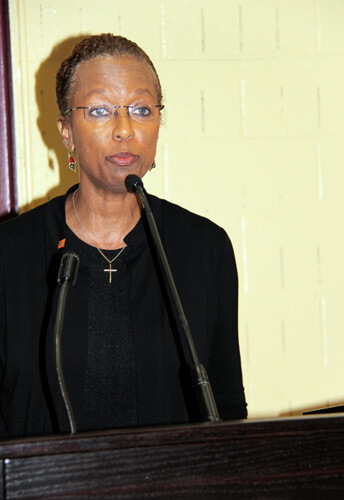By Nelson A. King
The United Nations says the Caribbean region is at an “important turning point” in its history.
In delivering a special message, on behalf of U.N. Secretary-General, Ban Ki-moon, at the 34th Conference of Heads of Government of the Caribbean Community (CARICOM) in Trinidad and Tobago , Executive Secretary of the Economic Commission for Latin America and the Caribbean (ECLAC), Alicia Bárcena, said this is “a time of hope when the member states of the Caribbean, by adapting their development model, placing equality at the center, can renew their efforts to collectively meet the challenges of the global environment.”
Ban underscored “the strength and the democratic values that the CARICOM countries have demonstrated during four decades.”
He also noted their resilience “in the face of external shocks, such as natural disasters and the global financial crisis.
“I appreciate the contributions of CARICOM countries to numerous issues on the global agenda, including the Millennium Development Goals, climate change, the importance of addressing non-communicable diseases and the unique challenges faced by Small Island Developing States (SIDS),” the U.N. chief said.
He made an account of the economic situation facing CARICOM member-states and the Caribbean region as a whole, putting forward a proposal for a new framework for regional growth and development, according to ECLAC, a United Nations agency.
He said the global economic situation and the current state of Caribbean economies “pose significant challenges that the region, as an integrated whole, must confront in order to spur growth and foster development with improved social conditions.”
Bárcena also underscored that the SIDS of the Caribbean, in order to advance their development aspirations, need the continued support of the wider regional and international community.
In this regard, she called for a “global partnership for prosperity of all states, especially small vulnerable SIDS.”
She urged that this “partnership” be built on three key pillars: the use of a structural gap approach for the classification of middle-income countries which includes vulnerabilities; the provision by international financial institutions of an improved funding mechanism to help small states undertake countercyclical policies during recessions; and strengthened aid for trade instruments to help the region build capacity to trade more competitive products and services.
In addition, Bárcena urged increased effort towards completion of the CARICOM Single Market and Economy (CSME).
Using the integration process and the CSME as a platform, as well as its solid base in natural and human resources, she urged the Caribbean to make a “big push” for the structural transformation of its economy.























